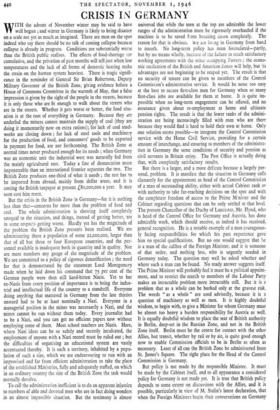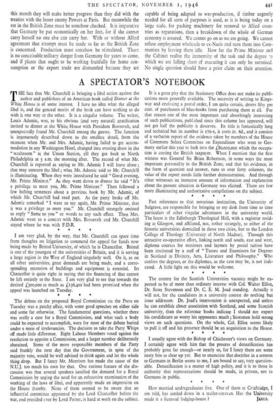CRISIS IN GERMANY
WITH the advent of November winter may be said to have well begun ; and winter in Germany is likely to bring disaster on a scale not yet as much as imagined. There are men on the spot indeed who say there should be no talk of coming collapse because collapse is already in progress. Conditions are substantially worse than the British public realises. The effects of food-shortage are cumulative, and the privation of past months will tell just when low temperatures and the lack of all forms of domestic heating make the strain on the human system heaviest. There is tragic signifi- cance in the reminder of General Sir Brian Robertson, Deputy Military Governor of the British Zone, giving evidence before a House of Commons Committee in the warmth of May, that a false impression is given by the sight of the people in the streets, because it is only those who are fit enough to walk about the streets who are in the streets. Whether it gets worse or better, the food situ- ation is at the root of everything in Germany. Because they are underfed the miners cannot maintain the supply of coal (they are doing it momentarily now on extra rations); for lack of coal steel- works are closing down ; for lack of steel tools and machinery for the production of food, and consumers' goods to be exported in payment for food, are not forthcoming. The British Zone at normal times never produced enough for its needs ; when Germany was an economic unit the industrial west was naturally fed from the mainly agricultural east. Today a line of demarcation more impenetrable than an international frontier separates the two. The British Zone produces one-third of what it needs ; the rest has to be imported from abroad, mainly from dollar areas, and it is costing the British taxpayer at present £8o,000,000 a year. It may soon cost him more.
But the crisis in the British Zone in Germany—for it is nothing less than that—concerns far more than the problem of food and coal. The whole administration is showing itself completely unequal to the situation, and things, instead of getting better, are in some respects getting worse. Hardly yet has the magnitude of the problem the British Zone presents been realised. We are administering there a population of some 22,000,000, larger than that of all but three or four European countries, and the per- sonnel available is inadequate both in quantity and in quality. Nor are mere numbers any gauge of the magnitude of the problem. We are committed to a policy of rigorous denazification ; the need for that is demonstrated by the statement Lord Montgomery made when he laid down his command that 75 per cent of the German people -were then still hard-bitten Nazis. Yet to bar ex-Nazis from every position of importance is to bring the indus- trial and intellectual life of the country to a standstill. Everyone doing anything that mattered in Germany from the late thirties onward had to be at least nominally a Nazi. Everyone in a managerial position in the mines was necessarily a Nazi, and the mines cannot be run without them today. Every journalist had to be a Nazi, and you can get no efficient papers now without employing some of them. Most school teachers are Nazis. Here, where Nazi ideas can be so subtly and secretly inculcated, the employment of anyone with a Nazi record must be ruled out ; but the difficulties of organising an educational system are vastly accentuated thereby. It is such a territory, inhabited by a popu- lation of such a size, which we are endeavouring to run with an improvised and far from efficient administration to take the place of the established Ministries, fully and adequately staffed, on which in an ordinary country the size of the British Zone the task would normally devolve.
To call the administration inefficient is to do an apparent injustice to numbers of able and devoted men who are in fact doing wonders in an almost impossible situation. But the testimony is almost universal that while the men at the top are admirable the lower ranges of the administration must be rigorously overhauled if the machine is to be saved from breaking down completely. The reason for that is obvious. We are liv.ng in Germany from hand to mouth. No long-term policy has been formulated—partly, but by no means wholly, because of the failure to reach satisfactory working agreements with the other occupying rowers ; the econo- mic unification of the British and American Zones will help, but its advantages are not beginning to be reaped yet. The result is that no security of tenure can be given to members of the Control Commission's administrative service. It would be none too easy at the best to secure first-class men for Germany when so many first-class jobs are available for them at home. It is quite im- possible when no long-term engagement can be offered, and no assurance given about re-employment at home and ultimate pension rights. The result is that the lower ranks of the admini- stration are being increasingly filled with men who are there because they would find it hard to hold their own at home. Only one solution seems possible—to integrate the Control Commission service with the Home Civil Service, providing for a certain amount of interchange, and ensuring to members of the administra- tion in Germany the same conditions of security and pension as civil servants in Britain enjoy. The Post Office is actually doing that, with completely satisfactory results.
But there is a larger, and a more delicate because a largely per- sonal, problem. It is manifest that the situation in Germany calls clamantly for the appointment as head of the Control Commission of a man of outstanding ability, either with actual Cabinet rank or with authority to take far-reaching decisions on the spot and with the completest freedom of access to the Prime Minister and the Cabinet regarding questions that can be only settled at that level. The present Chancellor of the Duchy of Lancaster, Mr. Hynd, who is head of the Control Office for Germany and Austria, has done admirable work, which should receive, as indeed it has received, general recognition. He is a notable example of a man courageous- ly facing responsibilities for which his past experience gave him no special qualifications. But no one would suggest that he is a man of the calibre of the Foreign Minister, and it is someone of that order, and nothing less, who is urgently needed in Germany today. The question may well be asked whether and where such a man can be found. No ready answer suggests itself. The Prime Minister will probably feel it must be a political appoint- ment, and to restrict the search to members of the Labour Party makes an intractable problem more intractable still. But it is a problem that as a whole can be burked only at the gravest risk. The words " as a whole " are used advisedly, because it is a question of machinery as well as men. It is highly doubtful wisdom, to begin with, to give a Minister for whom Germany must be almost too heavy a burden responsibility for Austria as well. It is equally doubtful wisdom to place the seat of British authority in Berlin, deep-set in the Russian Zone, and not in the British Zone itself. Berlin must be the centre for contact with the other Allies, but transit, whether by rail or by air, is quite good enough now to enable Commission officials to be in Berlin as often as necessary. Least of all can the British Zone be administered from St. James's Square. The right place for the Head of the Control Commission is Germany.
But policy is not made by the responsible Minister. It must be made by the Cabinet itself, and to all appearance a considered policy for Germany is not made yet. It is true that British policy depends to some extent on discussions with the Allies, and it is possible, particularly in view of M. Stalin's latest declaration, that when the Foreign Ministers begin their conversations on Germany this month they will make better progress than they did with the treaties with the lesser enemy Powers at Paris. But meanwhile the rot in the British Zone must be somehow checked. It is imperative that Germany be put economically on her feet, for if she cannot carry herself no one else can carry her. With or without Allied agreement that attempt must be made so far as the British Zone is concerned. Production must somehow be stimulated. There is no conceivable military danger from Germany for years to come, and if plants that ought to be working fruitfully for home con- sumption or the export trade are dismantled because they are capable of being adapted to war-production, if timber urgently needed for all sorts of purposes is used, as it is being today on a large scale, for packing machinery for removal to Allied coun- tries as reparations, then a breakdown of the whole of German economy is assured. We cannot go on as we are going. We cannot refuse employment wholesale to ex-Nazis and turn them into Com- munists by leaving them idle. How far the Prime Minister and the Cabinet realise the immensity of the task and the degree *a which we are falling short of executing it can only be surmised. No single question should have a prior claim on their attention.



































 Previous page
Previous page